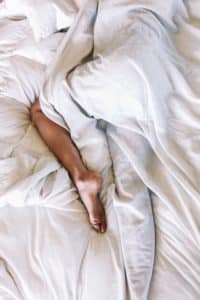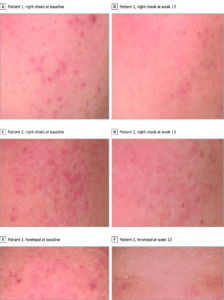Hormonal acne is a type of adult acne in which excess oil production clogs pores and causes inflammation. The cause is hormonal fluctuations that stimulate overproduction of sebum by the sebaceous gland in the pores. Although, in a sense, all acne is hormonal, it is these changes that are the biggest triggers in people with this condition. Like with other acne, understanding the cause is important before starting acne treatment.
Hormonal acne vs regular acne
Although in a sense all acne is hormonal, the type of acne that carries this name usually occurs in women during certain hormonal phases of life. People with hormonal acne often complain about flares around the times of their menstrual periods, during pregnancy and menopause. Also women with irregular periods, and conditions such as polycystic ovarian syndrome (PCOS) tend to have this type of acne. Women with regular periods and normal hormonal profiles, however, often also complain of worsening of their acne before their menstrual periods.
Hormonal acne in men
Although most people complaining of this condition are women, men and transmen undergoing testosterone treatment also get this experience these flares.
Pregnancy acne
Acne flares that occur because of pregnancy, or as result of the hormonal changes after delivery also fall under this category. Although the typical treatment can help, special concern must be given to whether the treatment is safe during pregnancy and breastfeeding.

Hormonal acne location on the face
The pimples, comedones, nodules, and cysts of this type of acne typically occur in the chin-strap area such as the chin, jaw and lower cheeks—the same area where a beard might grow. It also appears, however, on other parts of the body such as the neck, chest, arms and back.
Why does hormonal acne hurt?
When acne occurs as a result of a deep clog in the hair follicle that cannot drain, the body mounts an immune response to try to dissolve a hole to remove the accumulated oil and dead skin cells. In such cases the lesion is often painful. Deep, inflamed acne lesions can also cause scarring. These type of acne lesions are good candidate from acne surgery (puncture, drainage and extraction) and steroid injections. Prevention, however, is the best treatment.
Does hormonal acne itch?
Sometimes the inflammation of acne creates a sensation of itch rather than what one typically describes as pain. Itchy, however, is a type of pain. Thus, hormonal acne that itches, is acne that hurts.
Hormonal Acne- evaluation and treatment
Acne is the result of a variety of events that take place in the pore. Sticky skin cells, excess oil, the activity of bacteria, and an inflammatory response all contribute to the condition. It follows that there is sometimes no single “cure.” Individual patients may require a combination of interventions. Retinoid, dapsone, azelaic acid, and antibiotics can help and can chemical peels, acne surgery, and acne spot treatment with injections of steroids to calm inflammation. In the case of hormonal acne, however, special attention to the hormonal factors that create excess oil are a good course of treatment:
-
Underlying conditions
determine if there is an underlying medical condition such as PCOS, pregnancy, menopause or menstrual issue. Remember that many women with normal periods and hormonal profiles still experience hormonal triggers
-
Medications
Consider medications, such as testosterone and some type of hormonal birth control, that may be causing acne. Corticosteroids such as prednisone can also cause a steroid acne. In this case all the lesions tend to be of the same size and type.
-
Sleep and acne
Sleep is the periods in which organs like the skin recover and repair. Inadequate sleep can cause hormonal changes that contribute to acne flares.
7-8 hours of sleep and help your health overall and clear your skin -
Hormonal acne diet
High inflammatory foods, such as sugar can contribute. Some people are sensitive to dairy and chocolate. Leafy green vegetables in the diet seem to reduce acne flares. Read: 3 foods that cause acne
-
Hormonal acne skin care routine
Irritating and drying skin care products as well as products that clog pores (comedogenic) can contribute to these acne flares. Also, using products that interact with medications you are using can make acne worse Talk to your dermatologist for advice about skin care products for acne prone skin.
-
Hormonal acne and Birth control
Although birth control can be the solution, sometimes make this problem worse. If you are on birth control and your acne is not getting better, consider a change in pill. In other words, although it often helps, you can get hormonal acne from birth control as well.
-
Spironolactone
Spironolactone is a medication that is effective for this problem. Although generally safe, respect and consideration of side effects is important. The oral version is a diuretic that was originally used for the treatment of high blood pressure. It can have side effects such as excessive urination causing dizziness with standing, and irregular periods. Pregnant women should not take spironolactone because it blocks male hormones that can cause birth defects in male babies. Side effects are worse in women over 45 years old who take oral spironolactone. Men who take oral spironolactone can develop gynecomastia or male breasts. Luckily, now a spironolactone-like option, clascoterone, is available in a topical product (Winlevi) that does not have the same risk of side effects. WInlevi is also safe and effective in men.
Before and after results for Winlevi from the clinical trials -
Hormonal acne natural treatment
In addition to lifestyle changes, some people prefer to try supplements for acne. Oral and topic zinc has some evidence in helping reduce acne. Zinc had an anti-inflammatory effect. It is present in foods such as pumpkin seeds, meats, oysters, poultry, whole grains, nuts, eggs, legumes and dairy. If one takes zinc supplements be mindful to also take copper. Excess zinc depletes copper in the body. Zinc supplements can also cause nausea, diarrhea and liver inflammation.
-
Hormonal acne and Accutane
Accutane, or isotretinoin, is one of the most effective drugs in treating acne. The goal of Accutane therapy is cure. In the case of hormonal acne, however, Accutane treatment may not have as long term an effect—even after multiple courses.
Conclusion
Acne can have many causes. Consider the cause and it will be easier for you to devise a plan of action for addressing the issue and reducing your breakouts. For best results, see a specialist, like board-certified dermatologist for acne Dr. Dina Strachan, for specialized care. If you are struggling with any type of acne, a board-certified dermatologist has the most expertise to assist you in managing your skin.




